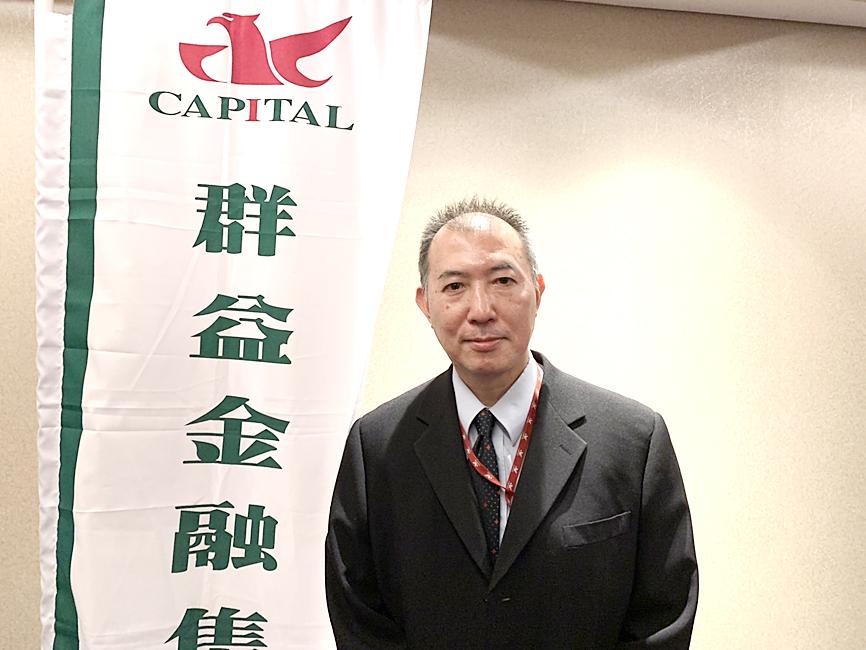The TAIEX is likely to hover between 13,000 and 15,000 points in the first and second quarters of next year as it enters consolidation mode, before rallying in the third quarter and climbing to 16,800 points in the fourth quarter, Capital Investment Management Corp (群益證投顧) said yesterday.
The TAIEX yesterday closed up 1.06 percent at 14,483.07 points, a record high, Taiwan Stock Exchange data showed.
The index is expected to face correction pressure in the first quarter of next year, which is usually a low season for the local technology sector, Capital Investment chairman Andrew Tsai (蔡明彥) said in a media briefing in Taipei.

Photo: Vanessa Cho, Taipei Times
The correction is expected to last into the second quarter, Tsai said, adding that investors tend to sell stocks with low-yield dividends before May, the beginning of the tax season, so they could pay less tax.
“While investors usually hold stocks with yields of at least 4 percent during the tax season, as the high yields would offset higher tax payments, there would be fewer stocks with high yields next year as most companies would remain cautious,” he said.
The TAIEX is projected to move to a range of 14,000 to 15,500 points in the third quarter, as the local technology sector would benefit from more orders in the peak season, Tsai said.
“Experts have predicted that herd immunity [for COVID-19] would be achieved in the third quarter, which would have a mixed effect on the market. Investors would feel relieved and be more optimistic, but governments might consider ending their quantitative easing programs,” he said.
Another risk the local stock market would face is volatility in the US stock market, which would be affected by US president-elect Joe Biden’s policies, Washington’s tax increases on the rich, tighter regulations on Facebook Inc, Apple Inc, Amazon.com Inc, Netflix Inc and Alphabet Inc’s Google, and an overheating of the initial public offering market, Tsai said.
If the US stock market does not crash and governments extend their quantitative easing programs, it is possible that the TAIEX would advance to 16,800 points at most in the fourth quarter, he said.
Capital Investment has an upbeat outlook for local biotech companies, due to rising demand for COVID-19 test reagents and vaccines. It is optimistic about the marine shipping sector on the back of robust demand, as well as sports and leisure equipment companies thanks to higher demand for fitness products, it said.
It also has an upbeat outlook for airlines, as border controls are expected to relax next year, and people might opt to travel on regional routes, such as from Taiwan to Southeast Asia, it said.

To many, Tatu City on the outskirts of Nairobi looks like a success. The first city entirely built by a private company to be operational in east Africa, with about 25,000 people living and working there, it accounts for about two-thirds of all foreign investment in Kenya. Its low-tax status has attracted more than 100 businesses including Heineken, coffee brand Dormans, and the biggest call-center and cold-chain transport firms in the region. However, to some local politicians, Tatu City has looked more like a target for extortion. A parade of governors have demanded land worth millions of dollars in exchange

Hong Kong authorities ramped up sales of the local dollar as the greenback’s slide threatened the foreign-exchange peg. The Hong Kong Monetary Authority (HKMA) sold a record HK$60.5 billion (US$7.8 billion) of the city’s currency, according to an alert sent on its Bloomberg page yesterday in Asia, after it tested the upper end of its trading band. That added to the HK$56.1 billion of sales versus the greenback since Friday. The rapid intervention signals efforts from the city’s authorities to limit the local currency’s moves within its HK$7.75 to HK$7.85 per US dollar trading band. Heavy sales of the local dollar by

Taiwan Semiconductor Manufacturing Co’s (TSMC, 台積電) revenue jumped 48 percent last month, underscoring how electronics firms scrambled to acquire essential components before global tariffs took effect. The main chipmaker for Apple Inc and Nvidia Corp reported monthly sales of NT$349.6 billion (US$11.6 billion). That compares with the average analysts’ estimate for a 38 percent rise in second-quarter revenue. US President Donald Trump’s trade war is prompting economists to retool GDP forecasts worldwide, casting doubt over the outlook for everything from iPhone demand to computing and datacenter construction. However, TSMC — a barometer for global tech spending given its central role in the

The Financial Supervisory Commission (FSC) yesterday met with some of the nation’s largest insurance companies as a skyrocketing New Taiwan dollar piles pressure on their hundreds of billions of dollars in US bond investments. The commission has asked some life insurance firms, among the biggest Asian holders of US debt, to discuss how the rapidly strengthening NT dollar has impacted their operations, people familiar with the matter said. The meeting took place as the NT dollar jumped as much as 5 percent yesterday, its biggest intraday gain in more than three decades. The local currency surged as exporters rushed to